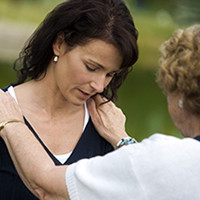
Contributor: Staff at Timberline Knolls Residential Treatment Center
In her 1993 book Wouldn’t Take Nothing for My Journey Now, Maya Angelou succinctly and powerfully described the profound pain that can occur in the aftermath of the loss of a family member, close friend, or another person of significance, also known as grief.
“I can accept the idea of my own demise, but I am unable to accept the death of anyone else. I find it impossible to let a friend or relative go into that country of no return,” Angelou wrote [1].
“Disbelief becomes my close companion, and anger follows in its wake. I answer the heroic question ‘Death, where is thy sting? ‘ with ‘it is here in my heart and mind and memories.’”
The Impact
The common term for the experience Angelou wrote about in this passage is grief. As described by the National Institutes of Health (NIH), grief is a natural response that can vary significantly from person to person.
Call Timberline Knolls for Help 855-630-2865
In general, grief can affect how a person feels, acts, and thinks [2]. Although grief can involve considerable pain, the process is normal and, in most cases, healthy.
However, in some cases, grief becomes so severe, or endures for such a protracted amount of time, that it causes significant harm to the person’s ability to function. As described in an article in the June 2009 edition of World Psychiatry, this is referred to in clinical terminology as “complicated grief” [3].
According to the authors, complicated grief occurs when a person is unable to move from acute grief to integrated grief. The authors estimate that about one in 10 people who lose a loved one will experience complicated grief, which can include symptoms such as anger, bitterness, intrusive and unwanted thoughts, and a preoccupation with the deceased person.
Grief & Addiction
 In the absence of effective professional help, people who struggle with complicated grief may turn to alcohol or other substances in a misguided attempt to ease their psychological pain. This behavior can put them at risk for myriad additional problems, including worsening distress, the onset of certain mental health concerns, and addiction development.
In the absence of effective professional help, people who struggle with complicated grief may turn to alcohol or other substances in a misguided attempt to ease their psychological pain. This behavior can put them at risk for myriad additional problems, including worsening distress, the onset of certain mental health concerns, and addiction development.
For people who are in recovery from addiction, complicated or unresolved grief can trigger a relapse. Regardless of if a person has previously received professional help for a substance use disorder, unresolved grief and untreated addiction can push them into a devastating downward spiral of despair.
And when a person does get help, it’s imperative that their care address both the substance use, their history of grief, and any other mental or behavioral health concerns.
Grief, Addiction, & Women
Both grief and addiction can impact women differently than men. In terms of addiction, both biological influences and societally enforced gender roles can affect which substances women may be more likely to use, how these substances will impact them, and how they may respond to treatment. For example, a June 2010 article in Psychiatric Clinics of North America noted the following about women, addiction, and treatment [4]:
- Women who enter treatment for substance abuse typically present more severe challenges (including physical, psychological, behavioral, and social concerns) than men.
- Experts estimate that 55%-99% of women who receive treatment for a substance use disorder have a history of physical or sexual assault.
- Depression and anxiety disorders, both of which may be associated with grief, are more common among women who seek treatment for addiction than men.
As outlined in a June 2018 article from St. Jude Children’s Research Hospital, women may be more likely to feel isolated in their grief, and they may experience greater frustration at the inability of others to share the process of working through their grief than men do [5].
This sense of stress, isolation, and frustration can put some women at elevated risk for substance use. If not properly addressed during treatment, these concerns may also diminish their ability to experience improved health.
A Comprehensive Path Forward
Anyone who struggles with unresolved grief and a substance use disorder needs comprehensive, personalized care from a provider who can identify and address the full scope of the person’s needs.
In terms of women or girls, treatment for grief and addiction must also include an awareness of the biological and sociological influences that affect female patients.
When women and girls receive personalized care and comprehensive support that is specifically customized to address their unique needs, they can begin to heal from grief while simultaneously building a solid foundation for successful, long-term recovery.
Transitioning from acute grief to integrated grief can be a long process. And recovering from a substance use disorder is a lifelong effort. With the right type and level of care, it’s possible for women and girls to achieve both of these objectives and experience a healthier and more hopeful future.
Resources:
[1] Angelou, M. (1993). Wouldn’t Take Nothing for My Journey Now. Random House.
[2] National Institutes of Health. (2017, Nov. 1). Coping with grief: Life after loss. Retrieved from: https://newsinhealth.nih.gov/2017/10/coping-grief.
[3] Zisook, S., & Shear, K. (2009). Grief and bereavement: What psychiatrists need to know. World Psychiatry: Official journal of the World Psychiatric Association (WPA), 8(2), 67–74. Retrieved from: https://www.ncbi.nlm.nih.gov/pmc/articles/PMC2691160/.
[4] Greenfield, S. F., Back, S. E., Lawson, K., & Brady, K. T. (2010). Substance abuse in women. The Psychiatric Clinics of North America, 33(2), 339–355. Retrieved from: https://doi.org/10.1016/j.psc.2010.01.004.
[5] St. Jude Children’s Research Hospital (2018). Gender Differences in Grieving. Retrieved from: https://together.stjude.org/en-us/for-families/bereavement/gender-differences-in-grieving.html#sectioned_content-bc459fba-c80c-4b84-8fdd-805613a5dfcf=1.
About Our Sponsor:
 At Timberline Knolls Residential Treatment Center outside of Chicago, Illinois, we provide specialized care for women and adolescent girls who are living with eating disorders, substance use disorders, and various mental health concerns. Our residential treatment and partial hospitalization programming (PHP) help our residents achieve lifelong recovery by combining clinically excellent treatment with spiritual and emotional growth. We provide care that is holistic, personalized, and nurturing, empowering women to be active participants in their wellness journeys.
At Timberline Knolls Residential Treatment Center outside of Chicago, Illinois, we provide specialized care for women and adolescent girls who are living with eating disorders, substance use disorders, and various mental health concerns. Our residential treatment and partial hospitalization programming (PHP) help our residents achieve lifelong recovery by combining clinically excellent treatment with spiritual and emotional growth. We provide care that is holistic, personalized, and nurturing, empowering women to be active participants in their wellness journeys.
The opinions and views of our guest contributors are shared to provide a broad perspective of addictions. These are not necessarily the views of Addiction Hope, but an effort to offer a discussion of various issues by different concerned individuals.
We at Addiction Hope understand that addictions result from multiple physical, emotional, environmental, and genetic factors. If you or a loved one are suffering from an addiction, please know that there is hope for you, and seek immediate professional help.
Published on January 5, 2021
Reviewed by Jacquelyn Ekern, MS, LPC on January 5, 2021
Published on AddictionHope.com

